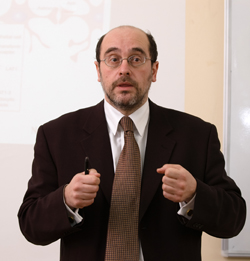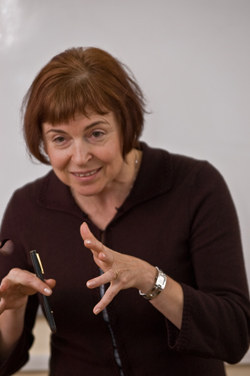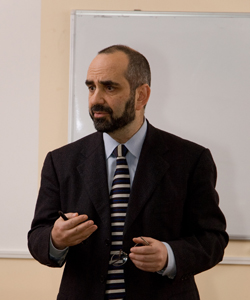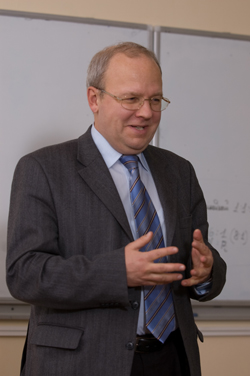 |
Alexander “Sasha” Kabanov, Ph.D., during a recent meeting in Russia with scientists from Moscow State University. (Photo by Igor Orshanskiy) |
 |
Tatiana Bronich, Ph.D., emphasizes a point during a recent meeting with scientists at Moscow State University. (Photo by Igor Orshanskiy) |
 |
Howard Gendelman, M.D., addresses colleagues from Moscow State University. (Photo by Igor Orshanskiy) |
 |
Alexei Khokhlov, Ph.D., D.Sc., professor and head of the department of polymer and crystal physics at Moscow State University, during the recent meeting between UNMC and Moscow State scientists. (Photo by Igor Orshanskiy) |
An interdisciplinary summer school that would allow professors and students from both schools to interact and engage in more visiting professorships and student exchanges were among the possible actions pondered during a two-day meeting in Moscow.
“Moscow State is the Harvard of Russia,” said Alexander “Sasha” Kabanov, Ph.D., Parke-Davis Professor of Pharmaceutical Sciences in the UNMC College of Pharmacy and director of the UNMC Center for Drug Delivery and Nanomedicine. “Both institutions stand to benefit from increased interaction.”
Dr. Kabanov — a Moscow State alumnus — made the trip to Moscow and was joined by Howard Gendelman, M.D., the Larson Professor of Internal Medicine and Infectious Diseases and chairman of the UNMC Department of Pharmacology and Experimental Neuroscience; and Tatiana Bronich, Ph.D., associate professor in the College of Pharmacy and associate director of the UNMC Center for Drug Delivery and Nanomedicine. Dr. Bronich also is a Moscow State alumnus.
UNMC already has an agreement with Moscow State that facilitates the medical center’s cooperation with the Russian university’s department of polymer science and department of polymer and crystal physics. Dr. Kabanov also is an adjunct professor in the Moscow State chemistry faculty and occasionally gives lectures to scientists there.
Since 1995, the two universities have published more than two dozen papers together, have filed several joint patents and have had extensive visitor exchanges.
One of the key discussion points during the recent meetings focused on UNMC also engaging in collaborations with Moscow State’s biology, chemistry and physics faculties, Dr. Kabanov said.
Moscow State is home to some of the world’s top basic scientists, Dr. Bronich said, and UNMC students and faculty would find interacting with these scientists to be an enriching experience.
Moscow State scientists, meanwhile, are very interested in UNMC’s push to increase its clinical and translational research efforts, Dr. Kabanov said.
“As it is here in the United States, interest in clinical and translational research also is growing in Russia,” Dr. Kabanov said. “This is an area of research that we are beginning to actively pursue here at UNMC and many at Moscow State are very interested to see how we go about this process.”
While in Russia, the UNMC team took part in a two-day seminar organized by Moscow State colleagues in which scientists from both universities shared information about their research in the area of nanomedicine and self-organization of complex biological structures. The collections of contributions during this seminar will be published in the Journal of Neuroimmune Pharmacology.
Dr. Kabanov particularly noted the efforts of academician Alexei Khokhlov, Ph.D., D.Sc., professor and head of the department of polymer and crystal physics, and academician Mikhail Kirpichnikov, Ph.D., D.Sc., dean of the faculty of biology and head of the bioengineering department, for facilitating the meeting.
The trip to Moscow was very productive, enjoyable and thought-provoking, Dr. Gendelman said. It left him excited by the prospect of working with the Russian scientists. He said Dr. Kabanov deserves a lot of credit for fostering and maintaining strong relationships with such a prestigious institution.
“It was really an experience of a lifetime,” Dr. Gendelman said. “Sasha’s relationships have opened doors to some potentially valuable relationships.”
Dr. Kohkhlov echoed the sentiments of the UNMC team, noting that Moscow State scientists are excited to see how the two institutions can collaborate in “translational activities.”